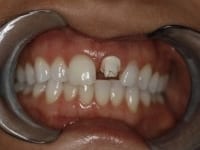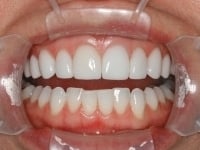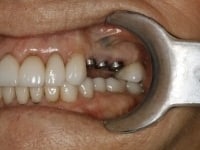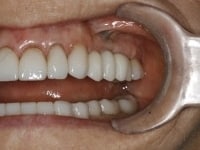What Can Dental Implants Restore?
Dental implants offer a long-term solution for missing teeth. They can restore strength, beauty and function to your smile because they are permanent.
Because they are secured in your jawbone and accepted as a natural tooth root, dental implants can also prevent bone shrinkage, a common side effect of tooth loss that is not preventable with other forms of tooth replacement. Learn more by calling Ronald W. Konig, DDS, FAGD, LVIF, at 713-668-2289 today.
Restoring the Health and Beauty of Your Smile
When you restore a missing tooth with a dental implant, there are benefits to your health, oral function and smile aesthetics. In these ways, dental implants restore:
- Ability to chew and bite
- Ability to enunciate words correctly and articulately
- Confidence when smiling, laughing and speaking
- Feelings of attractiveness, self-esteem and positive self-image
If these types of situations apply to you, then dental implants may be a great option. Restoring all of the aspects of a healthy, functional smile has emotional, mental and practical benefits for you in the long-term.
Before and After

Before

After

Before

After
Why Restore A Missing Tooth?
Missing teeth invite a host of problems, including:
- Change in bite tension
- Uneven tooth wear
- Potential for tooth collapse
- Limitation of food choices
Every tooth in your mouth performs a specific function. When you are missing one or more teeth, the function of that tooth is shifted to adjacent teeth. This, in turn, can lead to serious problems including TMJ/TMD, gum disease, and additional tooth loss. Dental implants are a solution for missing teeth and can help prevent these and other problems from occurring. Additionally, they can allow for more conservative dental treatment.
Treatment Choices
Restoring Your Dental Health with Your Treatment of Choice
Dental implants are just one of the options for restoring a missing tooth. Dr. Konig is extensively experienced in reconstructing the bite and rejuvenating oral health using various dental prostheses. He has the skill and knowledge to determine whether you can choose from dental implants, dental bridges and dentures to replace one or more missing teeth.
As you can see from the outcomes, dental implants restore a great many things. The proper balance and position of your bite is essential to your ability to use your teeth, and to feel comfortable and free of bite-related pain. But in addition to these more functional benefits, dental implants restore aspects of your emotional self-esteem by reinvigorating the appearance of your smile. You should never feel like you have to stifle a smile or laughter because of missing teeth, and Dr. Konig wants to help you enjoy your smile once again.
If you are searching for dental implants in Katy, TX, or any of the surrounding areas, please call the dentistry practice of Ronald W. Konig, DDS, at 713-668-2289 .
What Exactly is a Dental Implant?
A dental implant is not a tooth replacement all on its own. It is one part of a three-part restoration. The implant is a tiny titanium post that Dr. Konig inserts into the jawbone. The procedure is painless with the use of a local anesthetic. After placing the implant, he stitches your gum tissue over the post, leaving it to heal undisturbed. This can take up to six months. When bone tissue has grown around the implant (confirmed by dental x-rays), an abutment is placed. This is a small fixture that will connect the implant post to its restoration. Implants can support crowns, bridges, and full dentures. After placing the abutment, Dr. Konig stitches the gums around this piece. This means the abutment will sit on top of the gums. Finally, a few weeks later, you're ready to receive your final restoration!
How Long do Dental Implants Last?
One of the significant benefits of dental implant treatment is that the titanium posts can last indefinitely. That said, your dental implants will rely on your good oral care habits and optimal oral health for longevity. This is no different than your natural teeth. While neither your dental implants nor your crowns, bridge, or dentures, are susceptible to decay, your gum health can still degrade if you don't brush and floss as recommended. It is important to be conscientious about oral care and the avoidance of gum disease if you have dental implants. In general, the long-term success rate for dental implants is around 99 percent.
Can Any Dentist Perform Dental Implant Treatment?
Many general dentists offer dental implant treatment. However, it is advisable to do your research before deciding on a provider. Dental implant treatment is straightforward in terms of the steps that are involved. It's not straightforward in terms of the nuances that can affect the final outcome of treatment, such as the location and proper height of the implant post compared to the size of the restoration and overall measurements of the mouth. It takes a great deal of skill to ensure that opposing teeth fit properly so as not to cause too much force on the jaw.
Choosing a properly trained dentist is imperative to the outcome of your dental implant treatment. Dr. Konig is a Fellow of the Las Vegas Institute for advanced dental studies. He has completed several levels of core training at this prestigious post-graduate institution. Additionally, he completes hundreds of hours of advanced clinical training every year, including the most up-to-date training in dental implant treatment.
Can I Eat Normally with Dental Implants?
Restoring or maintaining your ability to eat all of your favorite foods is another reason to choose dental implant treatment to restore your smile. Once your implants have become surrounded by bone tissue and your final restoration is in place, you can eat whatever you'd like. Until that time, however, you need to be mindful about how you feel when introducing foods into your diet.
Don't expect to resume all of your normal eating habits right away after receiving your dental implants. While your jaw is healing and bone is growing around the implant, you may have more sensitivity or soreness than usual. During your initial recovery period, it's best to eat foods that are soft enough to cut with the side of a fork. While your diet may need to include soft foods, it's important that you focus on high nutrition as well. This will help progress optimal tissue healing. As a general rule, when you're still recovering from dental implant placement, if a food causes sensitivity or soreness, don't eat it just yet.

